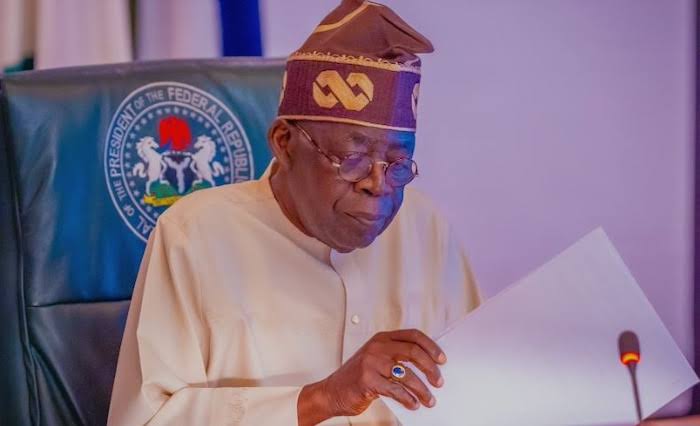Tinubu’s cabinet reshuffle and Niger Delta conundrum
Wednesday this week witnessed the first major cabinet reshuffle by President Bola Ahmed Tinubu since the inception of his administration on May 29 2023. In the exercise, the president sacked five members, redeployed 10, and brought on board seven new faces. Likewise was his renaming of the Ministry of Niger Delta Affairs to Ministry of […]

tinubu
Wednesday this week witnessed the first major cabinet reshuffle by President Bola Ahmed Tinubu since the inception of his administration on May 29 2023. In the exercise, the president sacked five members, redeployed 10, and brought on board seven new faces. Likewise was his renaming of the Ministry of Niger Delta Affairs to Ministry of Regional Development.
Incidentally, the cabinet reshuffle came in the wake of strident outcry across the country over suffocating conditions of living, under the Tinubu administration, especially with the disturbing withdrawal of subsidy on price of petrol and the aftermath. Hence the intent of the cabinet reshuffle was ostensibly to reposition his administration towards delivering the dividends of democracy as promised under the auspices of his Renewed Hope agenda.
However, with the eventual re-shuffling of the cabinet, new concerns have also arisen over some areas that need urgent review in the interest of the administration and the entire country, due to their potential for attracting untoward tendencies which run at cross-purposes with the course of the administration. In this respect, stands a topical one, the re-designation of the Ministry of Niger Delta Affairs. Judging from the thrust of responses in the public space, the Tinubu administration may be reading and adopting the wrong script or has a hidden agenda not open to the wider Nigerian society, as the development has a more that salutary implication for the administration’s dealings with the Niger Delta region henceforth.
Courtesy of the cabinet reshuffle, the Ministry of Niger Delta Affairs is now the Ministry of Regional Development with over-sight responsibilities for the Niger Delta Development Commission (NDDC), North East Development Commission (NEDC), and the nascent South East Development Commission (SEDC).
A major concern over this development derives from the well-founded fear of further marginalisation of the Niger Delta region. Against the backdrop of history, while the re-designation of the Ministry of Niger Delta Affairs may seem administratively convenient to the president, the situation has been met with justified groundswell of resentments in the region. The main grouse is with the lumping together of the NDDC with other regional interventionist development agencies which derive from different historical antecedents.
Whereas the development of the Niger Delta has remained a conundrum over time, and has spawned serial protests as well as costly armed resistance by the indigenous minority groups there, the other development agencies which are billed to share stable with the NDDC under the new ministry, derive from different histories. They represent the very majority groups that had held the Niger Delta region down politically, over time. Hence if nothing else, this dispensation has stirred up a groundswell of fears that the Niger Delta region, whose development is shouldered by the NDDC, shall be swallowed up in the new ministry, with telling effects.
Succinctly put, with the restructuring of the ministry, President Tinubu, whose relationship with the Niger Delta region has not been inspiring since inception of his administration in 2023 – having treated the zone as a pawn, has simply attracted further suspicion of his less than benevolent disposition to it. How this tendency will pan out in the coming weeks and months is any person’s guess.
Essentially, considering that the development conundrum of the region was created by serial marginalisation and exclusion by successive national governments, the new dispensation simply translates as Tinubu’s indifference to the plight of the region. This is so unless there are remediation efforts by the administration. At this stage it remains needless to cite proven historical fact that it is a wiser decision to avoid a crisis in governance of Rivers State and Niger Delta, than fighting to quell the onset of such.
Meanwhile, with respect to re-designation of the Ministry of Niger Delta Affairs, it is significant that a much authoritative voice as that of Chief Edwin Clark has spoken the gospel truth on the matter, when he observed that the new dispensation is simply an agenda to use Niger Delta development resources to develop other parts of the country. Incidentally, this mindset is shared by millions of ordinary citizens in the region, who are largely anonymous for now but if mismanaged may respond in a more bitter dimension with renewed agitation.
Among the thorny angles to the re-designation of the Ministry of Niger Delta Affairs are burning questions and issues associated with earlier conditions like the 13% derivation for the marginalised Niger Delta region, and other concessionary tendencies. For instance, a core question is whether the new Ministry of Regional Development will be disposed to provide the differential treatment of the respective development agencies now under its omnibus purview, without compromising their respective peculiarities?
For the Niger Delta, the experience of being hoodwinked by successive governments at the centre, has been a long lasting pain. With this new dispensation of re-designation of the Ministry of Niger Delta Affairs, the Tinubu administration has seemingly upped the odds against it. It, therefore, needs to launch a process of significant dialogue with the various interests groups in the Niger Delta region, towards providing credible assurance of their full inclusion in the course of governance, going henceforth. This should not be too much for the administration if it hopes that its past sins against the region can be forgiven.
